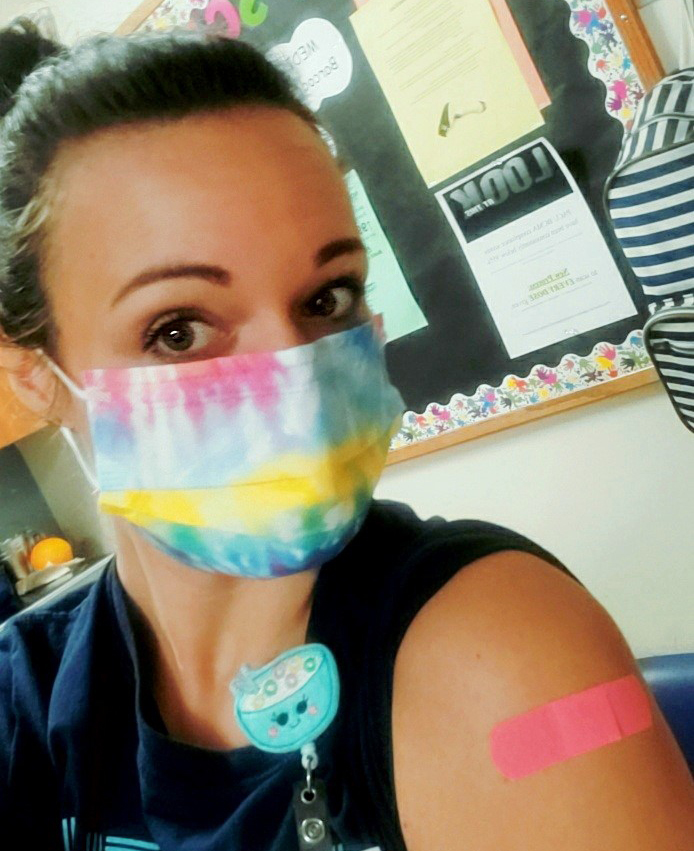The COVID-19 vaccine from a big city perspective

When Rachel K. Ward, BSN, RN prepares to care for a postsurgical pediatric COVID patient at Dell Children’s Medical Center in Austin, she dons fresh surgical scrubs, outer-space-like booties, a sterile gown, two sets of gloves, a face shield, a respirator and a mask over the respirator. It takes two people to dress her and so far--months into the coronavirus pandemic, these measures have protected her from infection, protected her patients, her colleagues, friends and other people around her.
None of these PPE measures come close to the protective step taken last Friday, Dec. 18 at 10 pm when Rachel received the first of two Pfizer vaccinations against the coronavirus. Her booster injection is scheduled for Friday, Jan. 8 th giving her a two-day weekend to rest and recover in case of any side-effects like fever and fatigue as her body’s immune system is jolted to fight any potential viral exposure.
In Dell’s PACU (Post Anesthesia Care Unit) Rachel receives children whose surgeries can’t wait. She is responsible for securing their airway, controlling pain then sending them home or onto other appropriate care. Increasingly, she is treating more COVID kids--sometimes 4-5 per week. In Recovery (as Rachel refers to it) these youngest patients have to be extubated—with the room cleared of only the anesthesiologist and Rachel. Sometimes they must be bagged, a process where oxygen is forced into the patient’s lungs manually. Sometimes they code and heart and lung function must be restored. Needless to say, these are handson, full-tilt critical emergencies with many opportunities for contamination if the patient is COVIID positive.
That’s why Rachel hasn’t been in a grocery store since April. Or to a gym—a really big deal. It’s why she hasn’t seen her twin sister since all this started ten months ago. Self-quarantining at home with only her roommate (also a healthcare provider) and two dogs, she runs in her neighborhood in the sunshine and depends on curbside delivery for everything.
It’s been challenging and stressful and fulfilling.
“I think I’m careful, but not afraid when I go into a COVID patient’s room,” she said on the phone Monday.
Asked about her vaccine experience, Rachel said like everyone else, she was hesitant at first and then reassured when she thoroughly researched Project Warp Speed.
“I totally get that it’s scary,” she said. “But you have to do your research and you have to use credible sources.”
She found the exact ingredients being used so she knows what was put in her body last Friday. The fact that these vaccines have actually been in production for 30 years with other COVIDS, helps mitigate the speed with which these two (so far) mRNA vaccines have been approved.
“You know COVID-19 is not the first COVID,” she said. “Also we’ve gotten rid of red-tape that might have slowed the process as well as the worldwide pooling of resources and sharing research. I think if you look at it logically and look at the science, you’ll understand the speed.”
One of her main concerns was possible fertility effects and she’s grateful we are smack in the middle of the Information Age, since plenty of credible sites have debunked false narratives about potential risks.
A handful of Rachel’s colleagues who say they’re not getting the vaccine citing unknown effects that the development process was too quick and that they prefer to wait for the second wave of vaccinations.
“The effects that they are talking about are 5, 10, 20 years down the road,” she said. ““I see so many immunocompromised kids [at work]. It’s just the right thing to do for the people around us.”
“We just can’t rely on our neighbor to determine what is best for us,” she said. “Everyone has to make up their own minds what is best for themselves and their families but all the science stuff, all the technology and all that we’ve learned about the virus make that easier.”
The sore arm--really sore--that she developed that set in a couple of hours after her jab left her unfazed. It’s the booster that she expects may “kick her booty” in a couple of weeks.
“I don’t want to argue about it,” she said. “After a year of this, I just don’t have the space for people who won’t do the research with credible sources and who just want to argue. I have no time for the political arguments and I’m frustrated at politicians who spent a year calling the whole thing a hoax, while holding fund-raisers in unsafe conditions and who are now lining up for the vaccine.”
“My charge nurse’s brother died of COVID during the summer and another nurse’s father just died,” she sighed. “Almost everyone now knows someone who got really sick or some who died and that’s changing attitudes.”
Rachel K. Ward grew up in Colorado. She has family in Canadian: Bob and Bettye Ward are her grandparents, Bob’s baby sister, Polly Ward Parnell is her great aunt; Kelley and Ruth Ward are her aunt and uncle, there’s a passel of cousins. Her twin sister Shelby, is an Early Head Start teacher in Asheville, North Carolina. She has two Bachelor’s degrees: a Bachelor of Science degree in Human Science (Human Development/Family Studies) from her mother, Kay’s alma mater Texas Tech University and a BS-Nursing from the University of Mary Hardin Baylor. She has been in nursing for five years, all in pediatrics with one year of travel nursing under her belt. She doesn’t regard herself as a hero in this war with the pandemic. She’s wrong about that.

